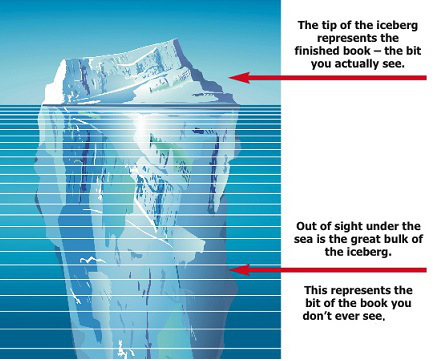Ramblings On The Craft : The Mythology Of The Writer
DISCLAIMER : I consider myself to be a life-long writer but I am still an aspiring author. What’s the difference? Essentially, to me anyway, it means that while I have devoted a great deal of time to my words and my art, the amount of money I have made as a professional writer to date could maybe be used to purchase a nice steak dinner for two. So while I have a deep and devoted passion for writing, I do not claim in any way to be an expert or authority figure. What you will find in these essays represent my personal thoughts and feelings about various issues related to writing. I think that in any endeavor, it is essential to have the mindset that there is always something to learn, something you don’t know. As soon as you start to think that you are an authority on anything (besides how to eat a hot dog or perhaps, spelling your name) there might be a problem. With that in mind, I am fully cognizant and comfortable with the fact that on any and all of these issues, I could be completely wrong.
Put another way, I recognize and admit that I could be full of shit.
.
.
.
I’m a writer.
It’s a simple sentence but for some reason there seems to be a ton of baggage and assumptions that come along with it. You can often see it in the eyes of the person you are talking to. There is often a mixture of respect and pessimism, fueled largely by how writers are portrayed in popular culture and a lot of the misconceptions about what writers do. Also, as writing is wrapped up inside the umbrella of artistic endeavoring, it’s natural to want to romanticize the process a bit, again something which is driven in no small way by the “writers” we see on the large and small screen.
I think that common perceptions of writers generally fall into two general categories. First, you have the staunch intellectual, the one with the gigantic libraries with the classic oak shelves that make you feel like you just stepped into an Oxford reading room. Our writer sits at a picturesque battleship of a desk, made out of wood that was recovered from an ancient pirate ship. Classical music plays softly from somewhere, likely a record player and this writer is more likely to be writing on a typewriter or with a fountain pen that looks like it would look at home on the desk of a Supreme Court Justice.
Stereotype number two is of the manic, obsessive writer, the one who looks like they have been wearing the same clothes for upwards of a week. This writer has a writing space, but is likely just as happy scribbling notes on the back of ATM receipts and cocktail napkins. Their working space is likely littered with overflowing ashtrays, empty bottles and wadded up pieces of paper. If you found yourself sitting near this person at a coffee house or a bar, especially while they were working, you might be privy to quite a bit of frantic mumblings and mutterings as this writer battles with their own inner voices that simply won’t leave them alone. This individual more than likely bounces from one part time job to another, somehow having just enough money to afford their meager little one room efficiency and at most hours of the day can be seen in a green army jacket, walking from the coffee shop to the bar or from the bar to the coffee shop, depending on which one is opening and which one is closing.
So what’s the truth? I wish I could give you an exciting answer and while most of us exhibit at least some aspects of those personalities, in the end we’re really just people.
The reality is that like anything else, there isn’t really a box that you can fit all writers into, and hold that up as encapsulating the depth and width of all of us. Our interests may tend towards the quirky, the esoteric. Often we feel a desire to explore the various facets of human behavior and see what we can do with it when we put our characters through the narrative wringer. But we are no different than anyone else who puts in the time to develop a specific skill set.
I think it is also important, just in terms of the scope of this essay, that I am drawing somewhat of a difference between working writers and those that are more hobbyists. And I am not using that word in a judgmental or dismissive way, simply that there are some people who purely write recreationally, and have no interest in publishing. The working writers are the ones who I am focusing on here, the ones who have the fortitude to get down into the muck, roll up their sleeves and work until the work is done. These are the ones who write the inkwell all the way down to the bottom, regardless of whether or not conditions are optimal.
I thought it would be helpful to list some common questions that we, as writers get from time to time and share some of my thoughts on them. And please, if you find some questions listed below which you have asked before, don’t feel bad. If one thing holds consistent from writer to writer it’s that we really do enjoy talking about our writing, even if it is a question that we are asked slightly more often than others. All I would ask is that if you do find yourself in a conversation with a writer, just listen to them. Ask specific questions, and don’t worry about how the person you are talking to might fall short or exceed whatever pre-conceived image you might have about writers.
.
“I don’t know what the big deal is, you just sit around and make stuff up…”
Writing is like a lot of other things in that there is a lot more going on in the process of creation that you don’t see and might not be aware of. It’s not unlike eating at a fine dining establishment where your seemingly simple plate of food was likely handled by a half dozen different people before it was sent out from the kitchen. Another way to think of it is to picture an iceberg. Now what you are seeing is actually only the small portion of the object which is above the surface of the water. There is a huge part which we don’t see and aren’t aware of and with writing, the same holds true.
It may seem like writing is merely the act of coming up with an idea and putting it down to paper but the reality of that process is a lot more complicated. Coming up with ideas is one thing, but that idea still needs to be crafted into a narrative form that is interesting and engaging to as many readers as possible. That narrative needs to be articulate in language that is clear and again, appealing to the reader. We have to create characters that are sympathetic or bring out your emotions. There is a lot of trial and error to this process and from start to finish, the story will be written and rewritten too many times to keep track of. You seek out the input of your peers and at no point during the entire process do you ever really feel like your story is ready to unleash onto the readers-at-large.
A skilled craftsman has the ability to make something look simple and easy. Just remember that whenever you read something from an author that you really like, chances were there was an embarrassingly large amount of bad writing that came before it. Keep that in mind the next time you really enjoy a book because there was likely a lot of time spent by that author, swimming in self-doubt and steeling themselves against what seems like inevitable criticism and scorn.
.
“Could I have a copy of your book when it comes out?”
This is a difficult one for us because on one hand, we like it when people show interest in our work and we want to get our books out to as many readers as possible. On the other hand though, at the risk of sounding selfish, we also don’t necessarily want to give away our work for free. If the section previous to this hinted at anything for you, it’s the amount of time and work that goes into creating a novel. It is a long and, at times soul-crushing experience as you battle against fatigue and the constant call to start new projects and in the end, you would like to see somewhat of a return for that effort. So while we certainly appreciate your interest, please consider the possibility of paying for the book. You will be doing a good thing with your money by supporting a local artist and I think that there is an extra bit of enjoyment when you know that the thing you have in your hands was brought into the world by someone you are close to personally. It’s a rough industry for writers anymore, with so many easy avenues to publish, it’s a lot harder for us to be heard and noticed. We rely a lot on people like you for support and we are infinitely grateful when you are willing to spend your hard earned money on the art we create.
.
“I’d write too, if I could find the time.”
Trust me, we likely have as many challenges to our time management as you do. Also consider that, despite what you may think, it is a very small percentage of authors who are able to support themselves on their writing alone. A survey I read a year or two ago showed ninety percent of self-published authors and even fifty percent of traditionally published authors were making less than a thousand dollars a year off of their writing. Often, we find ourselves needing to find a full time job or even a full time and a part time job in order to support ourselves and (in many cases) our family. We deal with the same time constraints as anyone else. There isn’t a trick or a spell that endows us with the power to introduce a twenty-fifth hour into the day. We work very hard, we pay attention to our time management, we make sacrifices with other recreational things we might want to do and we work to improve our craft so that when the time comes for writing to be done, our creative muscle is strong enough to be efficient with the time we have.
This statement also falls victim somewhat to the first question posted above in that it diminishes the efforts of the writer by failing to recognize how difficult the task is that we put ourselves to. Not everyone can write. Anyone can start a story but it takes a special subset who have the talent and work ethic to finish it. It isn’t just a matter of making free time and doing it, you have to bring a certain amount of ability to the process and not everyone has that. I can picture a glorious sunset in my head but I’m not going to be running to the canvas and grabbing my paints any time soon. Just because you can boil water doesn’t mean you can make an amazing bucatini marinara with ricotta. I’m certainly not going to head down to an operating theater and scrub in because I’ve watched a ton of episodes of ER and House.
.
“You have to stick to one genre.”
This is one that is perpetuated more by writers than non-writers. I alluded previous to this about the extreme difficulty in getting noticed as a published author. The challenge, especially for self-published authors is to stand out in the crowd and find readers in an increasingly noisy environment. The idea that you need to stick to one genre is one of those pieces of advice that have come to stick, mostly out of being repeated so many times. I think that one problem with this industry is that there is a large subset of people who don’t really understand that finding success is largely a result of catching lightning in a bottle but, instead of showing gratitude for their own success, they spend all their time trying to convince everyone who will listen why their bottle is better than everyone else.
The rationale here is that if you have a book that is successful and then change genres for your next book, your readers will get frustrated with you and lose interest. My problem with that logic is that even if it was true, if you write a second book and stayed to the same genre, but it was awful, those same readers will still turn away from you. If you write a good, engaging novel, unless it is a dramatic change, I have a hard time believing that a loyal fan will be so devoted to one genre that they won’t buy the book. And who’s to say that you might not pick up new fans from a book of a different genre? You might even introduce new readers to a story type that they never would have considered before. The point is that there is too much unknown about this aspect of your relationship with the reader to try and build a publishing platform around it. Maybe this isn’t the most practical business strategy but I genuinely believe that if you put out books that are good, you will find readers eventually, maybe not as fast, but eventually. I also think that the quality of your fans will be greater if you are putting out fresh material instead of just constantly perpetuating iterations of your first book.
.
“Hey, I’ve got an idea for one of your books…”
Okay, I’m going to stop you there and just say this. We appreciate that you are aware enough of what we do to bring this up in conversation. It is flattering somewhat in the sense that it has demonstrated that you have accepted us as being a writer. And like I said before, we have no problem talking about our writing. However, we generally have more than enough free-floating ideas running wild through our head and we really don’t need more. So at the risk of sounding rude or ungrateful, maybe you should write that book.
This was not an exclusive list by any means but were just some thoughts I had as well as some contributions from other authors on questions they have often encountered. I’m not going to pretend that we’re not a bunch of socially awkward, fearful, eccentric weirdos. Far from it. But we are all strange in our own unique, little twisted ways. So the next time you meet a writer, don’t fall back to the image that pops into your mind, planted and fertilized by assumptions and myths, perpetuated in pop culture. Everybody has a deep love for something, for us, that just happens to be books.
.
.
Books are truth, and that is the truth. That is what we seek, and that is all you need to know.
.
.









